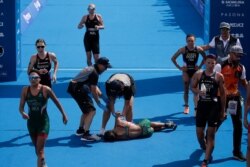There are growing concerns that the heat and humidity at the Tokyo Olympics next summer may pose a danger to athletes. The Japanese capital, one of the biggest and most densely populated cities in the world, regularly sees summer temperatures exceed 35 degrees Celsius (95 degrees Fahrenheit), with humidity exceeding 80% and strong sunshine.
Earlier this month, a worker at an Olympic construction site in the city died from heat stroke.
Across the country, a heat wave beginning in late July killed at least 57 people.
George Havenith, an expert on the effects of temperature and climate on athletes at Britain's Loughborough University, says the combination of heat and humidity could prove dangerous.
"When it gets warmer, of course the skin gets warmer and doesn't lose that much heat to the environment and the sweat evaporation then is the main factor for cooling," he said. "Now if we also push up the humidity as it would happen in Tokyo, that means that that sweat evaporation gets even more difficult. So it gets more and more difficult to lose the heat."
Heat stroke
Heat stroke is a big danger, especially for endurance events, adds Havenith.
"About 15 percent of athletes even in a cool environment have body temperatures above 40 degrees Celsius," he said. "Now if you push the temperature higher and the cooling gets more of an issue, we get more and more athletes in that whole cohort going into these temperatures above 40 degrees Celsius, bringing them closer and closer to the level where we can expect an exertional heat stroke."
Tokyo has hosted several test events in recent weeks, including a mixed triathlon relay and a swimming marathon — among the endurance sports seen as posing some of the biggest dangers to athletes. Japanese swimmer Yumi Kida, who hopes to compete in the Games next summer, says conditions in Tokyo Bay were difficult.
"The sunlight was strong and the water temperature was high. When I joined the race, I worried I might suffer from heat stroke," she said.
Precautions
Games organizers have shifted the start times of several endurance events to begin early in the morning — and say they are taking other measures to mitigate against the heat.
"The International Triathlon Union is taking a variety of measures against heat, such as increasing water-supply points and cooling areas. I also hear they are deploying medical staff every 500 meters of the marathon course," Yasuo Mori of the Tokyo 2020 Games Operations Bureau told reporters recently.
Havenith says additional measures may be needed.
"Having ice baths available for the athletes to cool them down quickly if they have an exertional heat stroke is the advised method," he said. "And it's very important to have that, because if you decide to transport them to the hospital before you do the cooling, you put them at risk. And with the ice bath, the success rate is very close to 100% in terms of people recovering from an exertional heat stroke."
The last time Tokyo hosted the Olympics in 1964, the Games were moved to October to avoid the summer heat. With a packed sports calendar and demands from global broadcasters, that's no longer possible.
Scientists say it's vital athletes acclimatize themselves well in advance of the start of the Games in July 2020.






